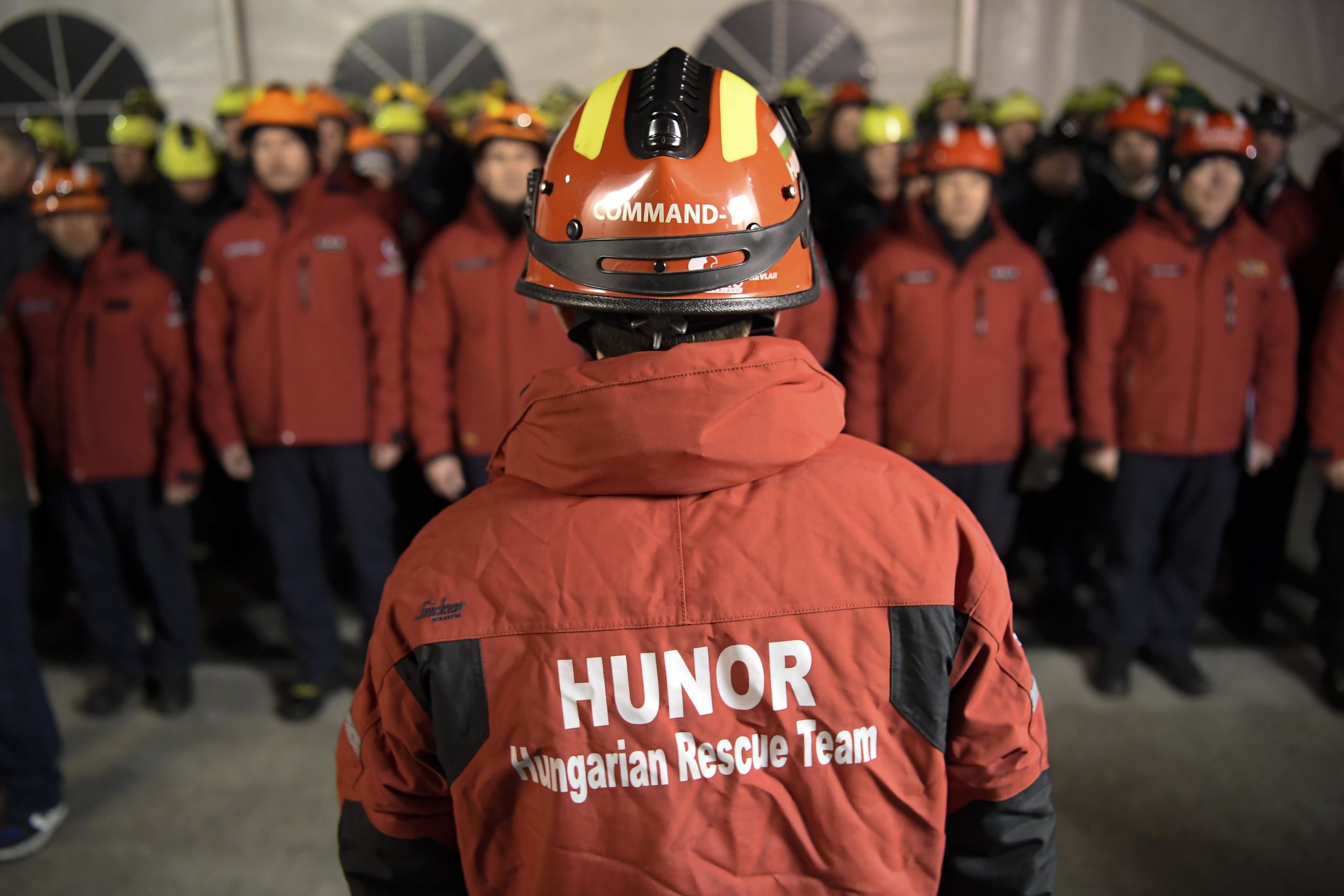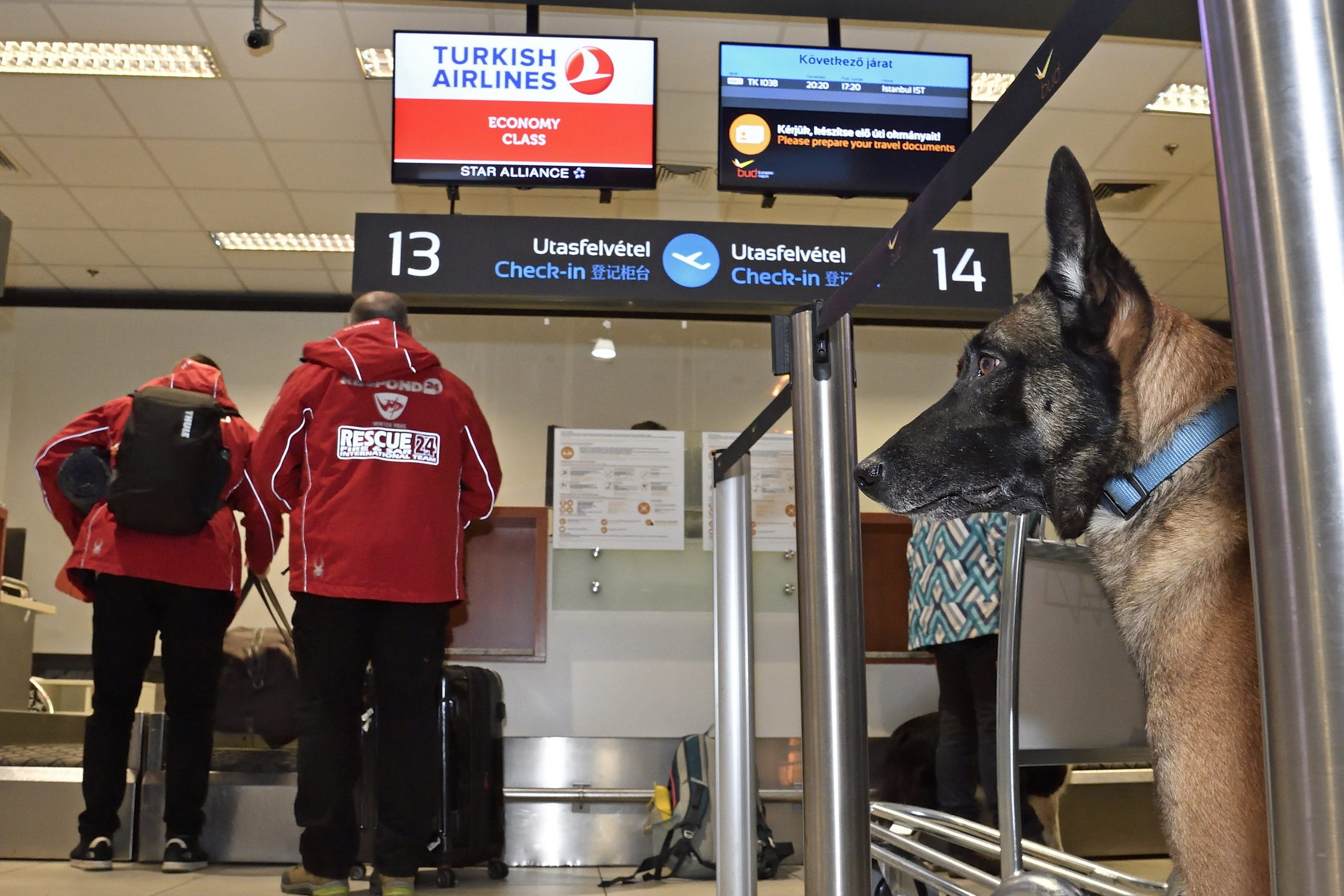
On Monday evening, a team from the Hunor rescue organization left Budapest for Turkey to help the victims of the earthquakes and their rescue. Bence Rétvári, Parliamentary Secretary of State at the Ministry of Interior, stressed at the farewell ceremony of the team of the National Disaster Management Directorate General that in such a disaster situation, the speed of assistance is a very important factor.
The faster help arrives, the more lives can be saved, he said, adding that the Hunor rescue unit was set up 11 years ago and since then the Hungarian disaster management has proven worldwide that it is one of the most prepared rescue organizations in the world. They have provided assistance in disaster situations in Serbia, Macedonia and Japan, among others.
The Hunor rescue team to Turkey has 55 members, including military medics and ambulance staff, as well as firefighters, and they also took search dogs. The crew and 90 tonnes of equipment was transported by a Hungarian Defense Forces Airbus 319 aircraft from Liszt Ferenc Airport to Adana Airport in Turkey.
The equipment of the Hunor team will ensure the self-sufficiency of the rescue team for 10 days, meaning that they will not have to use the resources of the local disaster management.
Hungarian Foreign Minister Péter Szijjártó announced on Tuesday morning that the Hunor rescue team has arrived in the worst-hit Hatay province on Monday evening in two buses and four trucks, where they have started work in the morning. He added that more Hungarian experts are scheduled to travel to the earthquake-affected areas soon to help search for survivors. Three organizations will send 46 rescuers and 15 rescue dogs to Turkey later today with a total of HUF 40 million (EUR 101,000) in government funding.
It was not only the Hunor ambulance service that rushed to the aid of the Turks, a special rescue team from the Hungarian Baptist Aid also left Hungary on Monday evening. The HUBA Rescue24 Firefighting and Search and Rescue International Team and an emergency medical team has assembled about two tons of equipment and contacted Turkish colleagues with whom the Hungarian rescue experts have worked before, they said.

The rescue team of the Hungarian Baptist Aid was accompanied by 19 rescue and medical professionals and seven rescue dogs. Image: MTI/Lakatos Péter
Szabó Márk, one of the team members, told MTI by phone that the rescue team members are constantly gathering information from international sources about the conditions on the ground, and are also taking a large inflatable tent and generators with them. They expect to work for seven to ten days, the first period of which will be spent searching, after which they will assist with medical care, he added.
The Hungarian Baptist Aid’s special rescue team also worked in Turkey in 1999 and 2001, at the site of the earlier earthquakes.
The southern part of Turkey, bordering Syria, was shaken by a 7.8 magnitude earthquake at dawn on 6 February, followed by several aftershocks. At 1.30 p.m. local time, there was another earthquake with a magnitude of 7.5, and on Tuesday morning, a 5.6 magnitude aftershock hit the country’s central part. The death toll has already exceeded 5,000 in Turkey and Syria, with 20,000 injured, according to Tuesday afternoon figures. In addition, more than 5,700 buildings had been destroyed. The earthquake affected ten provinces in Turkey: Kahramanmaras, Gaziantep, Sanliurfa, Diyarbakir, Adana, Adiyaman, Malatya, Osmaniye, Hatay and Kilis.
Driving through the Turkish city of Kahramanmaras shows the devastation caused by the deadly magnitude 7.8 earthquake ⤵️ pic.twitter.com/hEJSd44d3c
— Al Jazeera English (@AJEnglish) February 6, 2023
Rescue efforts are being hampered by the weather, with snow in some places and heavy rain in others, winds and temperatures in the region reaching only a few degrees Celsius, with frost expected in the days ahead. In addition, the damaged infrastructure is not conducive to rescue efforts, with Al Jazeera reporting that the earthquakes have caused severe damage to runways at the regions’ airports , leading to the closure of airports to civilian traffic. This further complicates the delivery of medical supplies and humanitarian aid to the regions.
The situation is further aggravated by the extremely large area affected by the destruction, and the inability of rescue teams to reach all areas. In Hatay province, for example, there are reports that many people are still under the rubble, but aid is scarce and they can not be rescued yet. The city of Maras was close to the epicenter of the quake and is believed to be one of the worst-affected areas. However, so far, few rescuers have made it to this part of Turkey. One search and rescue team is on their way to the city, reports BBC, but they have no idea how bad the devastation will be when they arrive.
Turkey has sent a formal request to NATO and allies for assistance in dealing with the aftermath of Monday’s earthquake. Many countries around the world has already rushed to Turkey’s aid and offered rescue teams and humanitarian aid. Among the helping countries are Hungary, the Netherlands, the United Kingdom, Germany, Austria, Pakistan and Israel. Israel has also offered help to Syria, even though Israel considers Syria a hostile state, and the two do not have diplomatic ties.
Although the damage is most severe in Turkey, nearby Syria has also been affected by the earthquakes, with buildings collapsing, hundreds killed and many injured. Raed al-Saleh, head of the Syrian opposition’s civil defense service, told Reuters that hundreds of families were still trapped under the rubble and needed to be rescued. He also called on humanitarian aid organisations to help them in the rescue.
Featured photo via MTI/Kovács Tamás